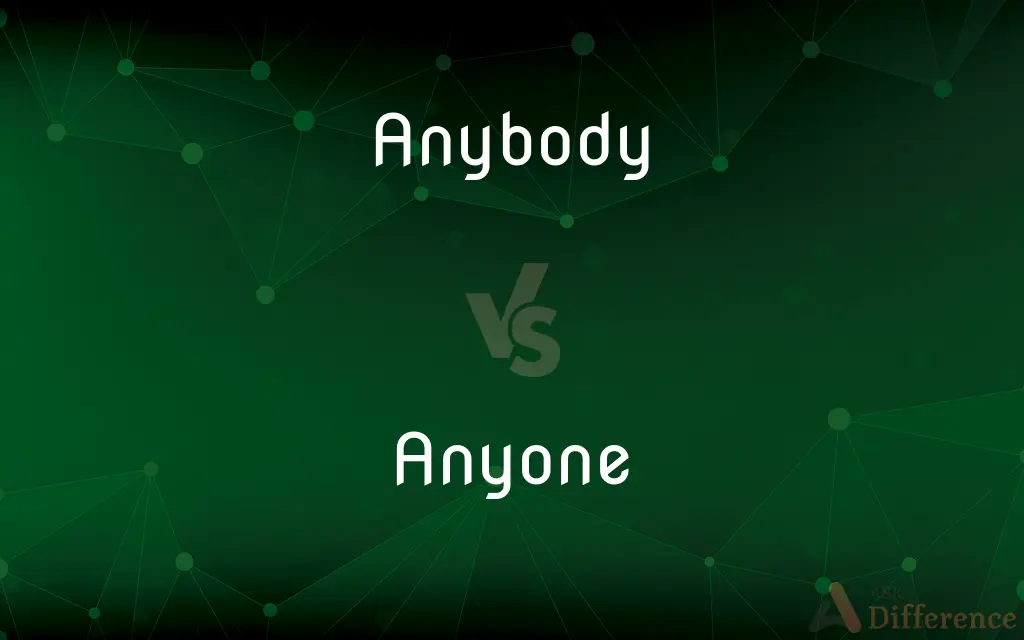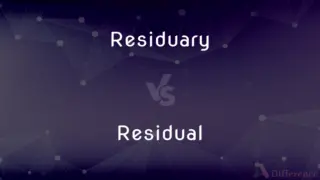Anybody vs. Anyone — What's the Difference?
By Tayyaba Rehman & Fiza Rafique — Updated on May 14, 2024
"Anybody" and "anyone" are interchangeable pronouns used to refer to any person, with no significant difference in usage or meaning.

Difference Between Anybody and Anyone
Table of Contents
ADVERTISEMENT
Key Differences
The terms "anybody" and "anyone" are both indefinite pronouns, commonly used in English to refer to an unspecified person. They are essentially interchangeable, with both terms appearing in questions and negative statements alike. For instance, "Is there anybody there?" and "Is there anyone there?" mean the same thing.
The choice between "anybody" and "anyone" often comes down to personal preference or regional dialect. In spoken English, "anyone" might sound slightly more formal than "anybody," but this distinction is subtle and not consistently observed.
Both "anybody" and "anyone" can be used to emphasize the idea of inclusivity or universality in a statement, as in "Anyone can join the club," which implies that there are no restrictions on membership. Similarly, "Anybody can learn to cook" suggests that cooking skills are accessible to all people.
Grammatically, these pronouns do not carry specific reference to gender or number, making them versatile and commonly used in everyday English. They serve well in scenarios where the speaker does not want to specify or does not know the identity of the person in question.
In literature or written content, the use of "anyone" can sometimes appear more common, particularly in formal writing, whereas "anybody" may be more frequently seen in casual or conversational contexts.
ADVERTISEMENT
Comparison Chart
Usage
Unspecified person, slightly less formal
Unspecified person, slightly more formal
Common Contexts
Conversational, informal
Both formal and informal
Examples
"Can anybody solve this problem?"
"Can anyone solve this problem?"
Implication
General inclusivity
General inclusivity
Grammatical Number
Singular, refers to any person
Singular, refers to any person
Compare with Definitions
Anybody
Any person, regardless of specifics.
Anybody could see that the solution was incorrect.
Anyone
Used when referring to people in general.
Anyone looking for help should ask a staff member.
Anybody
Used to express no preference in the selection of a person.
Anybody can come to the meeting if they're interested.
Anyone
Common in both questions and statements.
Does anyone know the time?
Anybody
Reflects openness and accessibility.
Anybody is welcome at the community center.
Anyone
Used to signify inclusivity or opportunity.
Anyone can participate in the survey.
Anybody
Often used in questions and negative statements.
I haven't seen anybody around here today.
Anyone
Suggests universality without specifying.
Anyone can become a great writer.
Anybody
Indicates potential in general terms.
Anybody can learn to sing with practice.
Anyone
Any person, interchangeable with "anybody."
Anyone could have taken the keys.
Anybody
A person of consequence
Everybody who is anybody was at the reception. See Usage Notes at anyone, every, he1.
Anyone
Any person; anybody.
Almost anyone can change a light bulb.
Anybody
Any one out of an indefinite number of persons; anyone; any person.
Anybody will do.
Is there anybody inside?
Anyone
One taken at random rather than by selection; anybody. [Commonly written as two words.]
Anybody
(informal) A person of some consideration or standing.
Everybody who wants to be anybody will come to Jake's party.
Here one isn't anybody, if one doesn't dance like Travolta.
Anybody
Any one out of an indefinite number of persons; anyone; any person.
His Majesty could not keep any secret from anybody.
Anybody
A person of consideration or standing.
All the men belonged exclusively to the mechanical and shopkeeping classes, and there was not a single banker or anybody in the list.
Common Curiosities
Is there any difference between 'anybody' and 'anyone'?
There is no meaningful difference in usage or meaning; the choice often depends on personal or regional preference.
How should I decide whether to use 'anybody' or 'anyone'?
The decision can be based on the tone you wish to convey, the formality of the context, or simply personal preference.
Are there any scenarios where only 'anybody' or 'anyone' should be used?
No, both pronouns are suitable for any scenario involving an unspecified person.
Do 'anybody' and 'anyone' imply a specific gender?
No, they are gender-neutral pronouns.
Can 'anybody' and 'anyone' be used interchangeably?
Yes, they can be used interchangeably in nearly all contexts.
Which is more formal, 'anybody' or 'anyone'?
"Anyone" might be perceived as slightly more formal than "anybody," but the difference is minimal.
What is the grammatical number of 'anybody' and 'anyone'?
Both are singular, referring to any person, one at a time.
Can 'anybody' and 'anyone' be used in formal writing?
Yes, both can be used in formal writing, though "anyone" might be slightly preferred in very formal contexts.
What kind of verb agreement do 'anybody' and 'anyone' use?
They use singular verb agreement, as in "Does anyone have the time?"
How does using 'anybody' or 'anyone' affect the inclusivity of a statement?
Both terms are inclusive, suggesting that there are no restrictions based on identity or number of participants.
Share Your Discovery

Previous Comparison
Residuary vs. Residual
Next Comparison
Tension vs. SuspenseAuthor Spotlight
Written by
Tayyaba RehmanTayyaba Rehman is a distinguished writer, currently serving as a primary contributor to askdifference.com. As a researcher in semantics and etymology, Tayyaba's passion for the complexity of languages and their distinctions has found a perfect home on the platform. Tayyaba delves into the intricacies of language, distinguishing between commonly confused words and phrases, thereby providing clarity for readers worldwide.
Co-written by
Fiza RafiqueFiza Rafique is a skilled content writer at AskDifference.com, where she meticulously refines and enhances written pieces. Drawing from her vast editorial expertise, Fiza ensures clarity, accuracy, and precision in every article. Passionate about language, she continually seeks to elevate the quality of content for readers worldwide.












































